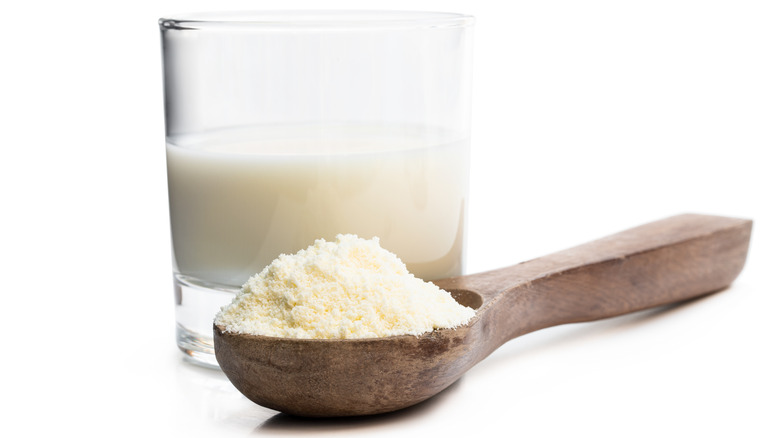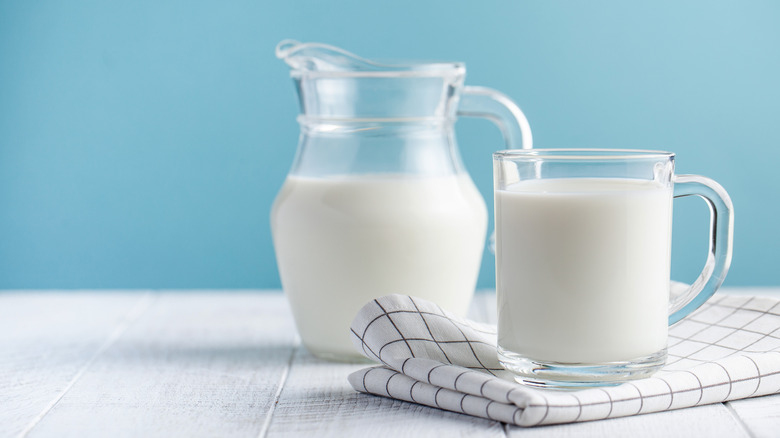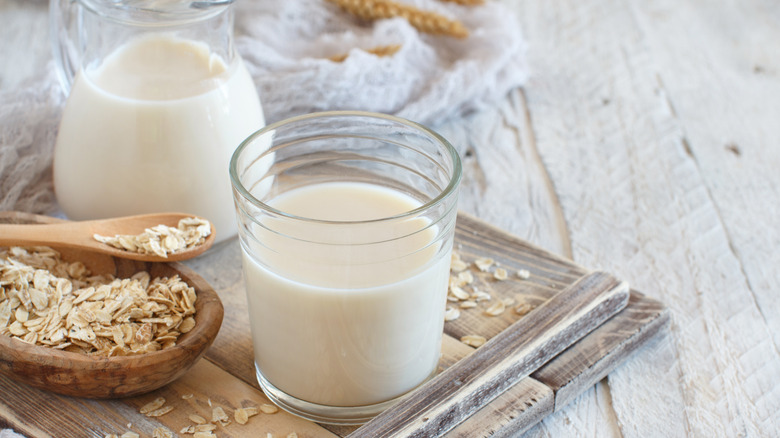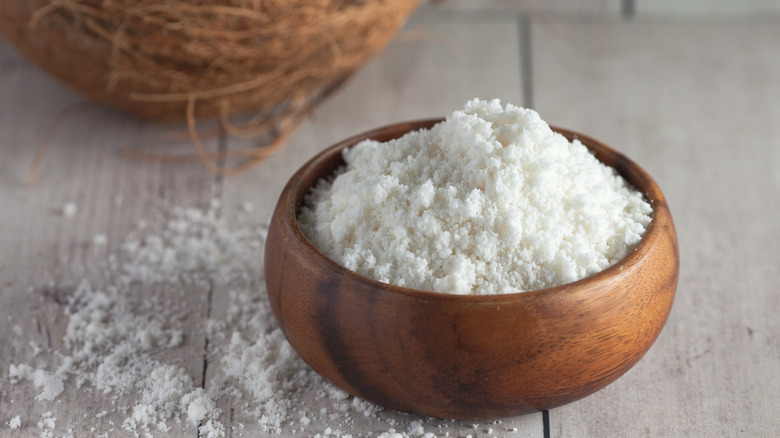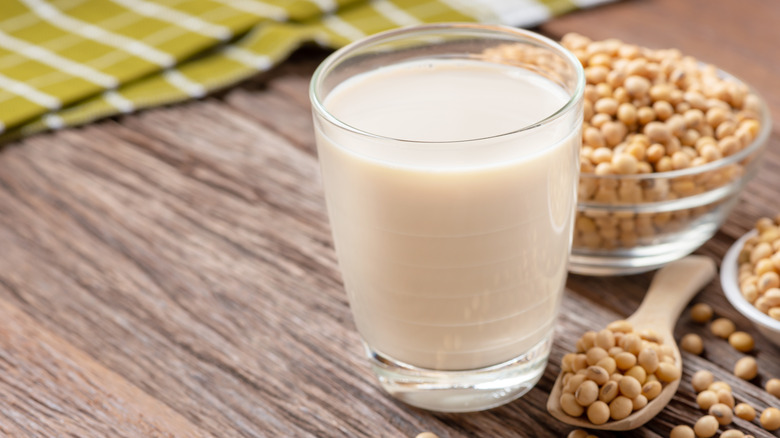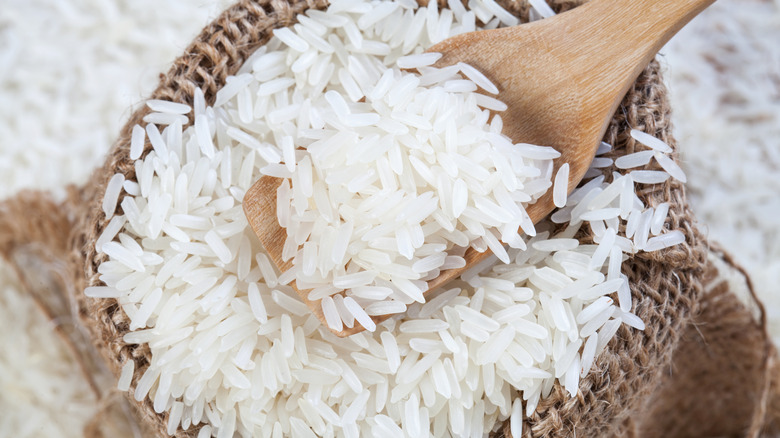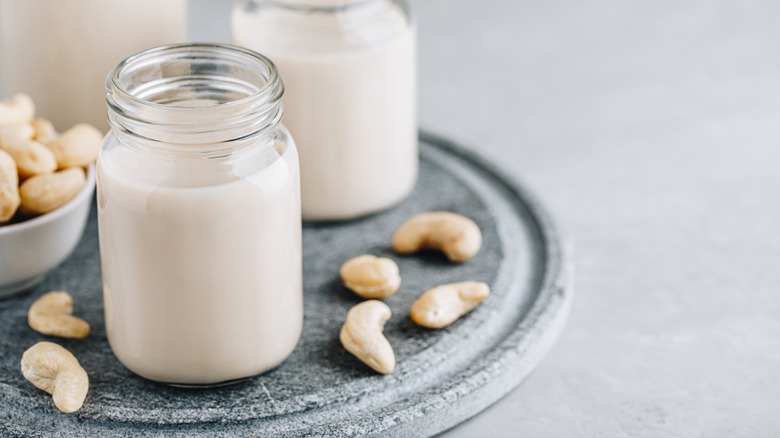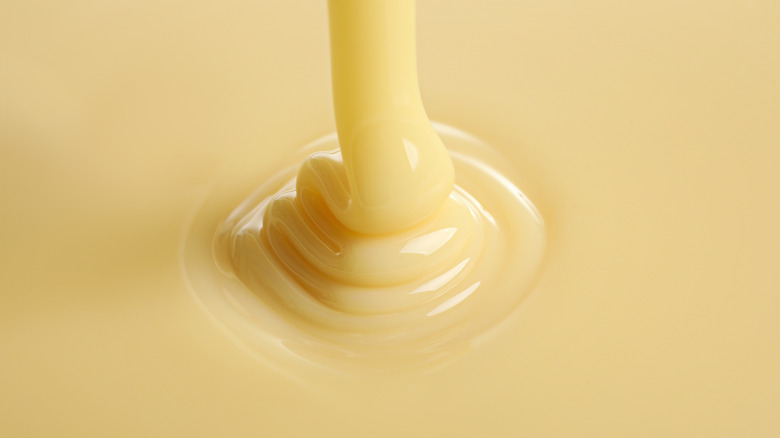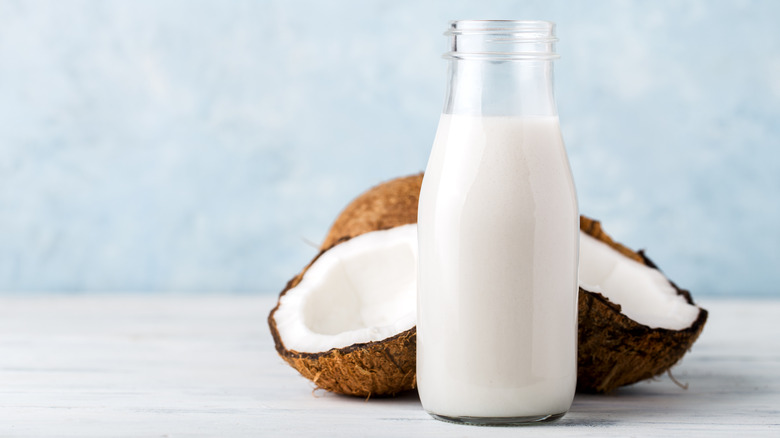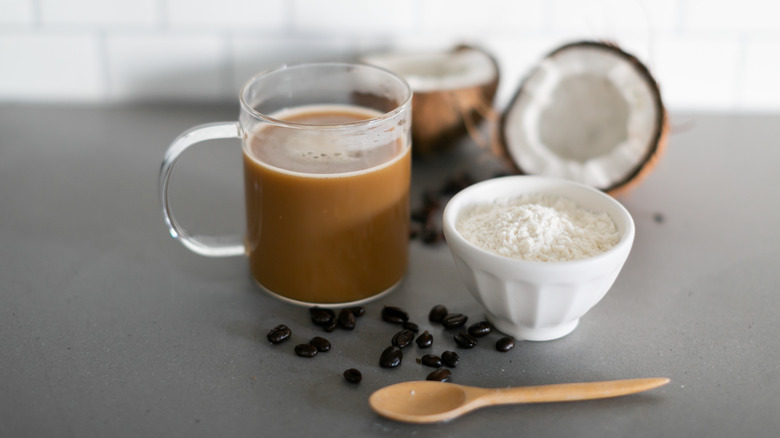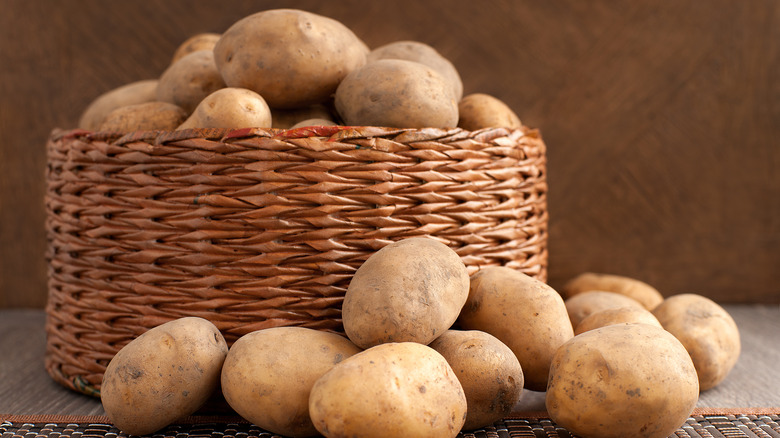10 Best Substitutes For Dry Milk
Dry milk, also called powdered milk, is milk that has been evaporated into powder form, giving it a much longer shelf life than the liquid version (via Nevada Dairy Farmers). Because of its lack of moisture, there are many perks to using the product, including the lack of a need for refrigeration. This means that it can last for ages without going bad and can be a solid source of milk to have in your pantry at all times. Plus, it has a similar fat and protein content to milk and is similar in flavor, too. For this reason, dry milk is sometimes preferred in baking over liquid milk, as it will not mess up the proportion of liquid in your recipe.
In an interview with Epicurious, Milk Bar owner and chef Cristina Tosi admitted that dry milk is a secret ingredient she often uses in her bakes. Although its taste is nothing extraordinary by itself, when added in baking, "it can make ice creams milkier, denser, silkier — and cookies chewier... [and] It just makes things taste better." So, what happens when you run out of dry milk? You substitute it.
1. Regular milk
Since dry milk is really just a moisture-less, powdered form of regular liquid milk, it makes sense that when you want to substitute dry milk, you can use regular milk. (In fact, if you add water to dry milk, you will have liquid milk again, says Food52.)
According to Healthline, the nutritional profiles of 1 cup of whole milk and 1/4 cup of dry milk are quite similar. In fact, the only differences between them is the calorie count, with whole milk having 149 calories and powdered milk having 159, and the percentages of your daily does of calcium, with whole milk having 20% and dry milk with 22%.
You can use regular milk in place of dry milk in any recipe that already has liquid in it, such as soup. However, with recipes that require dry ingredients, regular milk can make the final dish soggy. For best results, substitute 1/4 cup of dry milk with 1 cup of regular milk, and reduce the amount of liquid in your recipe by 1 cup.
2. Non-dairy liquid milk
Considering regular liquid milk is an easy substitute for dry milk, you could also use other, non-dairy kinds of liquid milk (such as almond, soy, or oat milk) as a replacement. Non-dairy milk has an added advantage over regular liquid milk when using it as a substitute for dry milk due to the fact that it can make one's dish both vegan and lactose-free.
As with regular liquid milk, Healthline suggests only using non-dairy liquid milk in recipes that already have some liquid in them. Another thing to keep in mind when using non-dairy milk is that each one will have a different flavor. If you use it to your advantage, your recipes can have a nice and nutty depth of flavor.
As for how one should use non-dairy milk as a replacement for dry milk, the same measurements used for regular milk will apply. You can use 1 cup of non-dairy liquid milk for every 1/4 cup of dry milk, while also cutting back the recipes liquid content by 1 cup.
3. Coconut milk powder
If you're lactose intolerant or follow a vegan or dairy-free diet, coconut milk powder is a great dairy-free alternative to dry milk. Coconut milk powder is made from coconut milk or coconut cream by spray-drying it, according to Tastessence, and should not be confused with desiccated coconut, which is made by shredding and drying coconut flesh (via Coconut Mama).
Since coconut milk powder is a powdered form of coconut milk or cream, it has a similar texture to that of dry milk and can be used in soups, curries, and fish, as well as meat-based recipes and sauces. Coconut milk is particularly popular in South Asian recipes, so coconut milk powder can easily substitute dry milk in South Asian cooking. However, Healthline warns that the fat content of coconut milk powder is higher than that of dry milk and can make baked goods heavier than expected.
Use a 1:1 ratio to substitute dry milk with coconut milk powder.
4. Soy milk powder
Just as dry milk is made by evaporating regular milk, soy milk powder is made by evaporating soy milk. Since soy milk itself is lactose-free and vegan, soy milk powder too is a dairy-free alternative to dry milk. Soy milk powder does have less calcium than dry milk, but has a similar amount of protein and is comparable in terms of nutrition to reduced-fat milk (via Healthline). A quarter cup of soy milk powder contains 90 calories, 3.5 grams of fat, 8 grams of protein, and accounts for 4% of the daily recommended calcium intake.
The Kitchen Community warns that some people may be allergic to soy and should use other dry milk replacements. Its low calcium content may also cause stomach problems, including gas. Soy milk powder can be used exactly as you would use dry milk in pretty much any recipe, baking or otherwise.
To substitute dry milk with soy milk powder, use a 1:1 ratio in any recipe.
5. Rice milk powder
Rice milk is made using two ingredients — rice and water. Rice is soaked in hot water and then blended and strained (via The Minimalist Baker). Rice milk powder then, is a powdered form of rice milk. Although it can be harder to find at grocery stores compared to other dry milk substitutes, rice milk powder is a dairy-free alternative to dry milk for vegans and anyone with lactose intolerance. Unlike soy milk powder, rice milk powder is also a suitable replacement for anyone allergic to soy.
Rice milk powder has a similar amount of protein, vitamin, carbohydrate, and fiber content as brown rice, reports The Daring Kitchen, and looks much like dry milk powder. However, in comparison to dry milk power, rice milk powder is creamier and sweeter, which makes in a perfect stand-in for teas and coffees, as well as baked items.
As with soy milk powder, Tastessence recommends using equal amounts of rice milk powder to substitute dry milk in your cooking.
6. Cashew milk powder
Plant-based chef Elysabeth Alfano, who spoke to LiveStrong, likes to use nut powders when baking because they are closer to flour than they are to milk, especially when it comes to cashew milk powder. "Cashew flour or powder is dreamy. It's rich and tasty and lends itself well to savory dishes," explained Alfano. Cashew milk powder also has a lower fat content than most other nut powders and contains the same heart-healthy monounsaturated fat that is found in olive oil (via Z Natural Foods).
Cashew milk powder, which has 60 calories, 9 grams of carbs, and 1.5 grams of protein, can be used in place of dry milk in both sweet and savory recipes. It will add a naturally nutty sweetness to baked goods and a rich creaminess to smoothies.
Healthline suggests that, in most cases, you can use a 1:1 ratio to substitute dry milk with cashew milk powder.
7. Evaporated milk
While dry milk has no liquid at all, evaporated milk is made by removing 60% of the liquid content from milk (via The Spruce Eats). It is similar to condensed milk, but considerably less sweet and syrupy.
Like powdered or dry milk, evaporated milk has a long shelf life and doesn't require refrigeration. It has a flavor similar to that of milk but is thicker in consistency and darker in color. It also has a fairly high amount of calories in comparison to dry milk. One cup of whole evaporated milk contains 338 calories, 19 grams of fat, and 17 grams of protein (via Healthline). Evaporated milk works best as a replacement for dry milk in liquid-based recipes where you want a thick and creamy consistency, such as teas, coffees, smoothies, and soups.
According to Our Everyday Life, dry milk and evaporated milk can be used as substitutes for each other. Half a cup of evaporated milk is equivalent to 3 tablespoons of dry milk mixed with 3 ounces of water.
8. Coconut milk
While coconut milk powder can certainly substitute dry milk in sweet and savory foods, coconut milk can also be used as a replacement for the dairy-based milk powder. Coconut milk is made by shredding the white flesh of the coconut and soaking it in hot water (via BBC Goodfood). The layer that rises to the top turns into coconut cream, whereas the liquid left at the bottom is strained through a cloth and turned into coconut milk.
Coconut milk is a lactose and dairy-free alternative to dry milk powder. While coconut milk can add a lovely flavor to baked goods, it can also make them dense and heavier than what is ideal. So, rather than use this as a stand-in for baked items, one should use it to thicken sauces, soups, and curries.
To replace dry milk with coconut milk, Leaf TV recommends swapping 1/4 cup of dry milk with 1 cup of coconut milk and removing 1 cup of liquid from the recipe.
9. Coffee creamer
Coffee creamers are typically found in liquid or powder forms and are made of sugar, oil, and thickeners (via The Spruce Eats). They're also usually dairy-free with no traces of milk, and quite thick, with high amounts of sugar. However, it's best to look at the ingredient list as that could vary from brand to brand and depending upon the flavor.
Contrary to what the name suggests, you can use coffee creamers for more than just sweetening your teas and coffees. Coffee creamers come in a variety of flavors, like hazelnut and vanilla, and can be used as an excellent substitute for dry milk in certain baked goods. Be advised, the same sweetness may not be such a good thing in savory and spicy recipes.
For best results, Our Everyday Life suggests using equal amounts of powdered coffee creamer to substitute dry milk.
10. Potato milk powder
Here's a dry milk substitute that you maybe never even knew existed — potato milk powder. Potato milk is a dairy-free and soy-free alternative to dry milk and is usually made by blending cooked potatoes with water and some kind of sweetener (via PennLive). The potato milk mixture is then left to evaporate (as with dry milk) until it turns into a powder.
According to Naturally Savvy, potato milk has tons of health benefits including being a good source of a lot of different vitamins, as well as calcium and iron; however, potato milk does lack protein. It's also a good dry milk substitute for anyone with severe food allergies and can be used in pretty much any recipe (via On The Gas).
To substitute dry milk with potato milk powder, Just A Pinch recommends using a 1:1 ratio.
